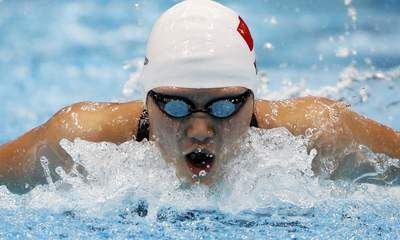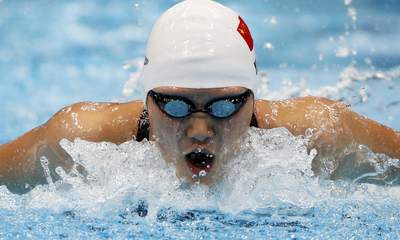China's Ye Shiwen Bags Second Gold
A Chinese swimmer whose sensational performance has raised eyebrows at the Olympics, has won her second gold medal.
Ye Shiwen, 16, swam to victory in the women's 200m individual medley with a time of 2 minutes and 57.07 seconds, beating Australia's Alicia Coutts into second place and America's Caitlin Leverenz into third.
An international row had erupted after Shiwen took five seconds off her personal best and more than a second off the world record in the 400m individual medley.
She was later cleared of using banned substances by the World Doping Agency.
John Leonard, the US executive director of the World Swimming Coaches Association, had earlier described the schoolgirl's performance as suspicious and "disturbing".
In comments that sparked rumours of doping, he branded the lightning-speed swim "unbelievable". Meanwhile, previous world record holder Steph Rice said it was "insanely fast".
As China reacted with anger to the suggestion of foul play, Ye denied taking performance-enhancing drugs and said her results come from hard work and training.
Olympic officials, other swimmers and former athletes also hit back, insisting that any competitor should be considered innocent until proven guilty.
British Olympic Association chairman Lord Moynihan said: "We know how on top of the game Wada (World Anti-Doping Agency) are and Wada have passed her as clean. That's the end of the story.
"And it is regrettable there is so much speculation out there. I don't like it. I think it is wrong. Let us recognise that there is an extraordinary swimmer out there who deserves the recognition of her talent in these Games."
Mark Adams, communications director for the International Olympic Committee (IOC) added: "These are the world's best athletes competing at the very highest level. We have seen all sorts of records broken already all over the place."
He stressed that a "very, very strong drug testing programme" was in place. "We are very confident that if there are cheats we will catch them, as we already have done," he said.
Asked if he was disappointed that talk turns to doping when a world record is smashed, he added: "It is inevitably a sad result of the fact that there are people who dope and who cheat but I equally think it's very sad if we can't applaud a great performance. Let's always give the benefit of the doubt to athletes."
Earlier, former Chinese basketball Olympian Ma Jian told Sky News that the US should not make allegations without evidence as thousands posted messages of support for Ye on China's popular microblogging site Weibo - the country's equivalent to Twitter.
"It's not classy at all to say that record-breakers have taken drugs. It's just jealousy," wrote one user. Another post said: "She's just a child. Don't be so beastly to her."
GB Olympic bronze medal winning swimmer Cassie Patten also told Sky News: "They have just branded her as a drugs cheat. It makes me very angry.
"She won the World Championships last year, she was ranked second in the world. She's not a new swimmer who has just come out of nowhere."
Olympic triple jump gold medallist Jonathan Edwards took to Twitter to express his concern.
The former GB champion wrote: "Forgive personal reference, but my WR 17 yrs old and never been doubted. If my nationality was different?? Point: if I can, anyone can."
He added: "In a country as populous as China, untapped potential mind blowing. Ye Shiwen may simple be Beijing legacy #InspireAGeneration."
Ye herself insists the team have nothing to hide, saying: "The Chinese team keep very firmly to the anti-doping policies, so there is absolutely no problem."
Sports lawyer John Taylor told Sky News there was not much else the young athlete, who has passed all her drugs tests, could do for now.
"The conundrum is that you get too good a performance like this and credibility is suspended and people start asking questions. All she can do is produce the samples and allow them to test her. There's not really much more you can do at this stage," he said.
The controversy erupted after an interview Mr Leonard gave to The Guardian.
He said: "We want to be very careful about calling it doping. The one thing I will say is that history in our sport will tell you that every time we see something, and I will put quotation marks around this, 'unbelievable', history shows us that it turns out later on there was doping involved.
"That last 100m was reminiscent of some old East German swimmers, for people who have been around a while. It was reminiscent of 400m individual medley by a young Irish woman in Atlanta."
This was a reference to Irish swimmer Michelle Smith who was banned for four years in 1998, two years after Atlanta, after testing positive for androstenedione.
"She looks like superwoman. Any time someone has looked like superwoman in the history of our sport they have later been found guilty of doping," the US sports coach added.

 Yahoo News
Yahoo News 

